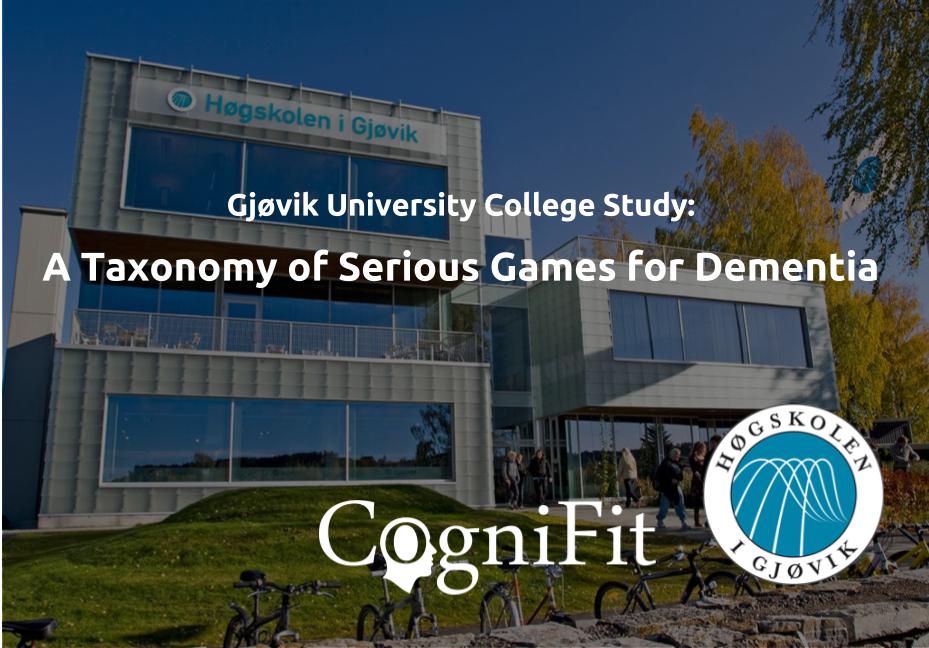
CogniFit ranked by scientists as a serious and effective battery of games to fight dementia
- Scientists from Gjøvik University College (Norway) have classified and evaluated in their study the main health games to combat dementia.
- CogniFit’s active aging program has positioned itself as leading technology in the prevention, rehabilitation, and evaluation of cognitive function in elders healthy or pathologically ill (Alzheimer’s, Mild Cognitive Impairment, Dementia, depression, insomnia, reduced mobility, etc.). CogniFit offers a series of validated clinical games aimed at preventing active and healthy dependence and aging.
- The review carried out by these scientists proposes that although there are many brain training games, only a few have a real effect on people with cognitive disabilities. It has been shown that CogniFit has scientific research that demonstrates that the effect of its cognitive training is long-lasting and transferable to everyday activities of older people.

Brain training games dementia- Scientific study
Dementia is one of the most important problems faced by welfare and social security systems. It is estimated that there are currently 35.6 million people with dementia worldwide. This number will almost double every 20 years, reaching an estimated 65.7 million in 2030 and 115.4 million in 2050.
The most common symptom or characteristic of dementia is memory loss but also there are impediments in thinking, communication, orientation and
to cope with everyday tasks. Other symptoms include personality changes, anxiety, depression, suspicion, delusions, and compulsive behaviors. Dementia has several causes/types, the most common being Alzheimer’ s disease.
There is currently a proliferation of companies offering cognitive training programs and brain stimulation games aimed at treating, evaluating or preventing some of the most typical diseases of our time (dementia, cognitive impairment, Alzheimer’s, etc.). However, there is quite a bit of confusion as to which programs are really serious, effective and useful in addressing the different types of dementia.
In this study, scientists Simon McCallum and Costas Boletsis of Gjøvik University College (Norway) have conducted a review of existing brain training games. The research carried out by these scientists proposes that, although there are many brain training games, only a few have a real effect on people with cognitive disabilities.
It has been shown that CogniFit has scientific research that demonstrates that the effect of its cognitive training is long-lasting and transferable to the activities of everyday living of older people.
CogniFit’s active aging program has positioned itself as a leading technology in the assessment, prevention and rehabilitation of cognitive function in healthy or pathologically elders and seniors (Mild phase Alzheimer’s, Mild Cognitive Impairment, dementia, depression, insomnia, reduced mobility,etc.).
CogniFit offers a battery of validated clinical games aimed at preventing active and healthy dependence and aging. Seniors are at high risk of developing a disease that affects the state of their cognition. CogniFit cognitive maintenance and active aging exercises aim to improve the well-being and quality of life of people as they age.
CogniFit’s mental stimulation and neurorehabilitation program allows for targeted interventions to suit older adults. Providing compensatory cognitive mechanisms and strategies to help you maintain proper mental health, autonomy, and competence for a longer period of time.
CogniFit is a validated cognitive stimulation and rehabilitation tool. This technology is made up of simple automated online brain games that are totally accessible to older adults.
To start using CogniFit, just register. The use of this clinical program is simple and accessible to everyone, including people unfamiliar with computer programs or cognitive intervention batteries.
- People over 50, older adults and seniors: This program is indicated for anyone interested in evaluating and improving their main cognitive functions.
- Family members or caregivers: The role of the family is essential to provide support to older adults and help them maintain, or improve, their cognitive functioning and mental speed, as well as, to achieve satisfactory aging and decrease dependency.
- Health professionals: This validated instrument of stimulation and neurorehabilitation can assist health professionals (doctors, psychologists, elder specialists, etc.) in the detection, diagnosis, and intervention of cognitive disorders associated with aging.
- Day centers and gerontological interventions: CogniFit’s cognitive rehabilitation tasks and games are very easy to apply, and are tailored to the unique characteristics of each senior.
- Researchers and scientists: The progressive aging of the population, together with an increase in life expectancy, makes it necessary to promote research aimed at improving the cognitive maintenance of older people and their quality of life.












